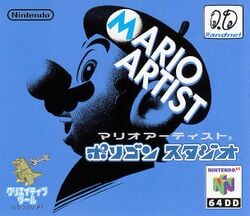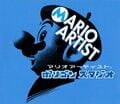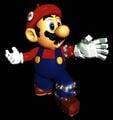Mario Artist: Polygon Studio
The title of this article is from the English Super Mario Bros. Encyclopedia, which reportedly sourced some names from fan wikis. If a higher-priority source is found, then the article should be moved to the new title.
This article is under construction. Therefore, please excuse its informal appearance while it is being worked on. We hope to have it completed as soon as possible.
| Mario Artist: Polygon Studio | |||
|---|---|---|---|

| |||
| Developer | Nintendo R&D 1 [1], Nichimen Graphics | ||
| Publisher | Nintendo | ||
| Platform(s) | Nintendo 64DD | ||
| Release date | Template:Release[?] | ||
| Genre | Creative | ||
| Rating(s) |
| ||
| Mode(s) | Single player, multiplayer | ||
| Input | Nintendo 64:
| ||
Mario Artist: Polygon Studio (マリオアーティスト ポリゴンスタジオ) is the fourth and final game released in the Mario Artist series and overall Mario franchise on the Nintendo 64DD, released in Japan only for said console on August 29, 2000.
The game allows players to construct and render 3D polygons, then texture them, and paint them. The player can also assemble models from pre-made or player-made parts and use them to explore a 3D world called the Experimental World and find newer, more effective parts. Along with this, two minigames are included: Sound Bomber, a simple predecessor to the WarioWare series, and Go-Go-Pack, in which the player "winds up" their model and tries to get them to stop at a certain distance before a cliff, serving as a predecessor to the minigame Chicken Race in WarioWare, Inc.: Mega Microgame$! Both minigames have three tiers of difficulty.
Microgames
Gallery
Artwork
Mario artwork
Screenshots
A flying egg pursuing the player
A tube creature in the overworld
References to other games
- Mario Paint: The "baby face" from this game can be seen floating in the background of the model creation menu, and will make its signature noise when clicked on. As with all other Mario Artist titles, a dog's head serves as the "Undo" icon, a reference to Undodog. When starting up the game, there is a chance that a scene of two figures doing aerobics will play, just like in this game. The Baker brothers leaving behind messages for the player in the Experimental World are eventually revealed to be these same two figures, and they can both be collected and used as blocks by the player.
- Super Mario 64: Untextured versions of Mario and Yoshi's models from this game can be loaded in the Polygon Editor. A part called the Power Star can be found in the Experimental World mode, which makes all Power Block parts perform like their most superior counterparts.
- Kirby 64: The Crystal Shards: An untextured version of Kirby's model from this game can be found in the Polygon Editor.
References in later games
- WarioWare, Inc.: Mega Microgame$!: The concept of microgames originated from Polygon Studio's Sound Bomber mode. The introduction stage taking place inside a boombox is a direct reference to Sound Bomber. Additionally, all of the Sound Bomber microgames appear in this game, under different names and with different graphics and controls:
- JUMP appears as Crazy Cars.
- BLOCK appears as Diamond Dig.
- SHOOT appears as Repellion.
- ROULETTE appears as Wario Whirled.
- BASEBALL appears as Batter Up.
- FLIES appears as Mario Paint: Fly Swatter.
- RACE appears as Hectic Highway and Racing 112.
- MAZE appears as Maze Daze.
Staff
- Main article: List of Mario Artist: Polygon Studio staff
External links
References
| Nintendo 64 games | ||
|---|---|---|
| Super Mario franchise | Super Mario 64 (1996) • Mario Kart 64 (1996) • Mario no Photopi (1998) • Mario Party (1998) • Mario Golf (1999) • Mario Artist: Paint Studio* (1999) • Mario Party 2 (1999) • Mario Artist: Talent Studio* (2000) • Mario Artist: Communication Kit* (2000) • Mario Tennis (2000) • Paper Mario (2000) • Mario Artist: Polygon Studio* (2000) • Mario Party 3 (2000) • Dr. Mario 64 (2001) | |
| Donkey Kong franchise | Diddy Kong Racing (1997) • Donkey Kong 64 (1999) | |
| Yoshi franchise | Yoshi's Story (1997) | |
| Crossovers | Super Smash Bros. (1999) | |

















